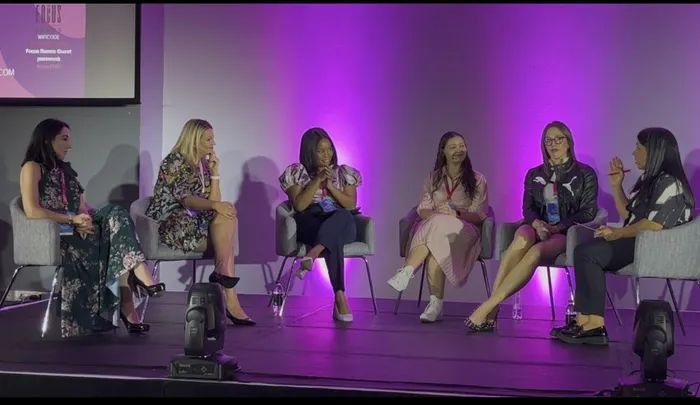
At the Africa Creator Festival, in Johannesburg, a panel discussion called, The Future of Creator-Brand Partnerships: Trends, Technologies, and the Legalities. (L-R) Amanda Rogaly, founder of Baby Yum Yum.com, Emma Sadleir the Digital Law Company, Keitumetse Sesana Acting Deputy Chief Executive Officer at SAIT, Casey Mantle chair of the IAB South Africa Influencer Marketing Committee, Nicole Capper, General Manager at Humanz and Marchelle Gordon moderator.
Image: Oluthando Keteyi/IOL
South African social media influencers have been sent into a frenzy, following the warning to get their tax affairs in order, as the South African Revenue Service (SARS) looks into undeclared income earned through online content creation.
The digital economy in South Africa is still growing and developing, which is why some influencers are not aware of the financial obligations to SARS.
At the Africa Creator Festival, in Johannesburg, a panel discussion called, The Future of Creator-Brand Partnerships: Trends, Technologies, and the Legalities, educated digital creators and cleared the fog on the tax issue.
The panel consisted of Amanda Rogaly, founder of Baby Yum Yum, Emma Sadleir the Digital Law Company, Keitumetse Sesana Acting Deputy Chief Executive Officer at SAIT, Casey Mantle chair of the IAB South Africa Influencer Marketing Committee, Nicole Capper, General Manager at Humanz and Marchelle Gordon was the moderator.
Acting Deputy Chief Executive Officer at the South African Institute of Taxation, Keitumetse Sesana, simplified the news for attendees and reminded them of their obligations to tax.
“By virtue of the fact that you're born here and you have ties here to South Africa, every rand cent that you make belongs to this country, and the revenue service can collect it. That's consideration in cash, but there's also consideration in kind,” said Sesana.
“It's enshrined in section one of our income tax act that every rand you make be a payment, or if you got this incredible trip that someone is sponsoring, the market value of that trip needs to be cleared.
“All these beautiful unboxing, you have received. The market value of that gift forms part of your gross income as you sit here.”
Sesana explained that tax works in and out; when the brand sends you the package, they deduct it from their expenses on their side, and SARS wants to see who receives the income on the other end.
She went on to add that since 2012, SARS can actually see what’s in a person’s account, and when the declarations one makes do not match the assessment, they finalise it on that.
"One needs to understand that because you're a resident, everything belongs to South Africa, and SARS' mandate is to collect. This year, they need to collect R2.006 trillion, that's after paying refunds. So every rand that you make needs to go into the pot.
“You guys (influencers) operate in the digital economy. As much as I can see you are consuming your content, they can see it too.”
Emma Sadleir, from The Digital Law Company, went on to emphasise that when it comes to lifestyle audits, all content on social media can and will be used as evidence in court cases and in the system.
Not only did budding influencers learn about their tax obligations but also the creator charter, the responsibily and rights that influencers. The day included masterclasses on YouTube, understanding platforms such as Humanz and interactions at the content hub which allowed some free creation with the brands on display such as Sorbet J.C Le Roux and Sodastream.
IOL
Related Topics: